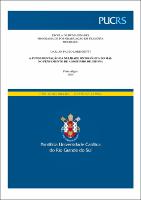| Share record |


|
Please use this identifier to cite or link to this item:
https://tede2.pucrs.br/tede2/handle/tede/9313Full metadata record
| DC Field | Value | Language |
|---|---|---|
| dc.creator | Lorenzetti, Darlan Paulo | - |
| dc.creator.Lattes | http://lattes.cnpq.br/1456241272721046 | por |
| dc.contributor.advisor1 | Pich, Roberto Hofmeister | - |
| dc.contributor.advisor1Lattes | http://lattes.cnpq.br/1645884955155770 | por |
| dc.date.accessioned | 2020-11-03T18:49:02Z | - |
| dc.date.issued | 2020-03-05 | - |
| dc.identifier.uri | http://tede2.pucrs.br/tede2/handle/tede/9313 | - |
| dc.description.resumo | O objetivo central da presente dissertação é examinar o processo de fundamentação da nulidade ontológica do mal empreendido pelo filósofo cristão Agostinho de Hipona (354-430) no contexto da filosofia Patrística. Num primeiro capítulo, o trabalho reconstitui basicamente os aspectos gerais da cosmologia agostiniana, com ênfase nos conceitos de: creatio ex nihilo (criação a partir do nada), criação simultânea, matéria informe, rationes seminales (razões seminais) e ordem. A exposição do capítulo subsequente busca elucidar os fundamentos da noção ontológica de Bem. Em razão disso, toma o conceito agostiniano de Deus e estabelece uma correlação do mesmo para com a ideia de Sumo Bem. Em seguida, aborda o conceito de natureza, intentando, concomitantemente, realizar uma distinção entre dois níveis, isto é, a natureza divina e a natureza criada. Explora o tema da fundamentação antropológica da vontade livre, qualificando-a como um bem. No terceiro e último capítulo, a explanação tem como foco a apresentação do cerne da teodiceia agostiniana, ou seja, a tese acerca da nulidade ontológica do mal e a definição deste como privatio (privação). Expõe as categorias de amor e liberdade da vontade, assim como a hierarquização dos bens criados inerentes à ontologia de Agostinho. Trabalha, finalmente, o conceito de livre-arbítrio, situando e compreendendo o mal desde uma perspectiva moral e, portanto, relativa ao agir humano, definindo-o como consequência do uso desregrado da vontade livre. | por |
| dc.description.abstract | The main objective of the present dissertation is to examine the process of grounding the ontological nullity of the evil undertaken by the Christian philosopher Augustine of Hippo (354430) in the context of patristic philosophy. In the first chapter, we reconstitute the general aspects of Augustinian cosmology, with emphasis on the concepts of: creatio ex nihilo (creation of nothingness), simultaneous creation, informal matter, rationes seminales (seminal reasons) and order. In the following chapter we seek to elucidate the foundations of the ontological notion of Good, taking the Augustinian concept of God and establishing a correlation between it and the idea of the Supreme Good. Next, we approach the concept of nature, trying at the same time to make a distinction between two levels, that is, divine nature and created nature, exploring the theme of the anthropological foundation of free will, qualifying it as a good. In the third and last chapter, we concentrate our attention on the presentation of the nucleus of Augustinian theodicy, that is, the thesis on the ontological nullity of evil and its definition as privatio (deprivation), in addition to exposing the categories of love and freedom of the will, as well as the hierarchy of created goods inherent in Augustine's ontology. Finally, we work on the concept of free will, placing and understanding evil from a moral perspective and, therefore, relative to human action, defining it as a consequence of the unregulated use of free will. | eng |
| dc.description.provenance | Submitted by PPG Filosofia ([email protected]) on 2020-06-19T13:22:20Z No. of bitstreams: 1 Darlan Paulo Lorenzetti - Dissertação.pdf: 808923 bytes, checksum: 3dc1f6bac21ce63588e3b32c73d15052 (MD5) | eng |
| dc.description.provenance | Approved for entry into archive by Caroline Xavier ([email protected]) on 2020-11-03T18:42:30Z (GMT) No. of bitstreams: 1 Darlan Paulo Lorenzetti - Dissertação.pdf: 808923 bytes, checksum: 3dc1f6bac21ce63588e3b32c73d15052 (MD5) | eng |
| dc.description.provenance | Made available in DSpace on 2020-11-03T18:49:02Z (GMT). No. of bitstreams: 1 Darlan Paulo Lorenzetti - Dissertação.pdf: 808923 bytes, checksum: 3dc1f6bac21ce63588e3b32c73d15052 (MD5) Previous issue date: 2020-03-05 | eng |
| dc.description.sponsorship | Conselho Nacional de Pesquisa e Desenvolvimento Científico e Tecnológico - CNPq | por |
| dc.format | application/pdf | * |
| dc.thumbnail.url | http://tede2.pucrs.br:80/tede2/retrieve/179267/DIS_DARLAN_PAULO_LORENZETTI_CONFIDENCIAL.pdf.jpg | * |
| dc.thumbnail.url | https://tede2.pucrs.br/tede2/retrieve/185889/DIS_DARLAN_PAULO_LORENZETTI_COMPLETO.pdf.jpg | * |
| dc.language | por | por |
| dc.publisher | Pontifícia Universidade Católica do Rio Grande do Sul | por |
| dc.publisher.department | Escola de Humanidades | por |
| dc.publisher.country | Brasil | por |
| dc.publisher.initials | PUCRS | por |
| dc.publisher.program | Programa de Pós-Graduação em Filosofia | por |
| dc.rights | Acesso Aberto | por |
| dc.subject | Agostinho de Hipona | por |
| dc.subject | Criação | por |
| dc.subject | Deus | por |
| dc.subject | Livre-arbítrio | por |
| dc.subject | Mal | por |
| dc.subject | Vontade | por |
| dc.subject | Augustine of Hippo | eng |
| dc.subject | Creation | eng |
| dc.subject | God | eng |
| dc.subject | Free Will | eng |
| dc.subject | Evil | eng |
| dc.subject | Will | eng |
| dc.subject.cnpq | CIENCIAS HUMANAS::FILOSOFIA | por |
| dc.title | A fundamentação da nulidade ontológica do mal no pensamento de Agostinho de Hipona | por |
| dc.type | Dissertação | por |
| dc.restricao.situacao | Trabalho será publicado como artigo ou livro | por |
| dc.restricao.prazo | 24 meses | por |
| dc.restricao.dataliberacao | 03/11/2022 | por |
| Appears in Collections: | Programa de Pós-Graduação em Filosofia | |
Files in This Item:
| File | Description | Size | Format | |
|---|---|---|---|---|
| DIS_DARLAN_PAULO_LORENZETTI_COMPLETO.pdf | DARLAN_PAULO_LORENZETTI_DIS | 789.96 kB | Adobe PDF |  Download/Open Preview |
Items in DSpace are protected by copyright, with all rights reserved, unless otherwise indicated.




